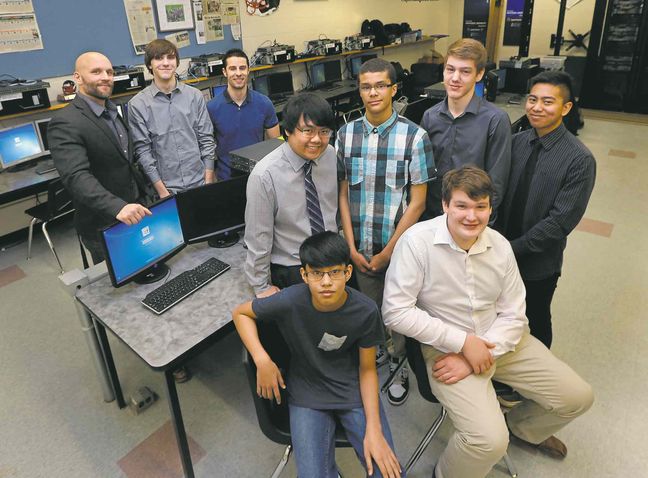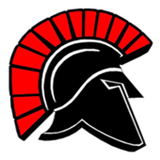Sisler CyberDefenders Washington-Bound for Fourth Year
February 5, 2021

[Front row (from left) Raven Tiroy and Zach Vasas; (second row) Jarren Mercado, Deondre Gismondi, Ryan Domino and Ian Crisostomo and team leaders (at rear from left) Charles Bazilewich, Nick Dixon and Robert Esposito.]
[From The Winnipeg Free Press print edition, 2015/02/28. Article by Nick Martin. Photo by Wayne Glowacki]
North Korean cyber-hackers beware: cyber-defenders at Sisler High School are being trained to repel hackers, and they're adept enough to take on the best in an upcoming international competition.
They're more than a computer club that meets occasionally over lunch hour.
We're talking the brightest of students earning as many as nine credits in Sisler's network and cyber-security program. They head to the Washington, D.C., area March 11 to compete in the CyberPatriot VII National Finals Competition.
This is the fourth consecutive year Sisler is among a dozen high school teams competing in an extraordinary event offering huge pots of scholarship money and boasting major defence contractors as sponsors.
Stand down, Jack Bauer, these Sisler kids are on our side.
"We're in advance of the Manitoba curriculum, considerably," said Sisler principal George Heshka, with significant understatement.
"It's been the driving force behind Manitoba education updating its curriculum," said teacher Charles Bazilewich. "We are designated as a vocational school in this area."
The Selinger government provided Sisler with a $300,000 grant that allows Sisler "to create a virtual online classroom" in which students can do amazing things, while remaining in a safe cyberspace environment, Bazilewich said.
"We're the first high school in Canada to offer that environment -- it's based on what the American colleges are doing."
Bazilewich and fellow teacher Robert Esposito explained the students are learning how to protect themselves online within an ethical environment -- while they learn how to attack in order to learn how to defend, they learn not to do anything in cyberspace that is malicious.
"It's a safe sandbox environment" isolated from the Internet, he said.
In the Washington competition, "They're required to protect a live business from an aggressor."
Mentor Nick Dixon, already working with an IT firm after graduating from Sisler two years ago, said a possible scenario could be working for a company selling CDs online for $10, suddenly hit by hackers changing the selling price to zero.
"You have to keep up the critical business services from hackers," said student Jarren Mercado, the only member of the six-person team who's competed in Washington before.
Jarren said the students will have a half-hour or so to design the defences in their assigned network, closing off open doors and seeking out the vulnerable spots, never knowing when or how their attackers will show up. They lose points if their web server goes down.
"You have to build your defences," said student Ryan Domino.
Zach Vasas said the Sisler students need to run scans constantly to spot the intruders. "There's a lot of ways they can find ways into your network, if you have open ports you shouldn't have."
Yes, they also know how to hack, said Ian Crisostomo, but the Sisler students will never use their powers for evil. They know, as Peter Parker once learned, with great power comes great responsibility: "In order to train how to prevent them, you have to know what to do," Crisostomo said.
Jarren said the students can't defend if they're always one step behind -- they have to think like the hackers.
Raven Tiroy and Deondre Gismondi are -- wait for it -- doing this sophistocated level of wizardry in Grade 9.
When Bazilewich spoke to Grade 8 students at Meadows West School last year, said Raven, he couldn't sign them up fast enough.
The competition information is at http://www.uscyberpatriot.org/.


